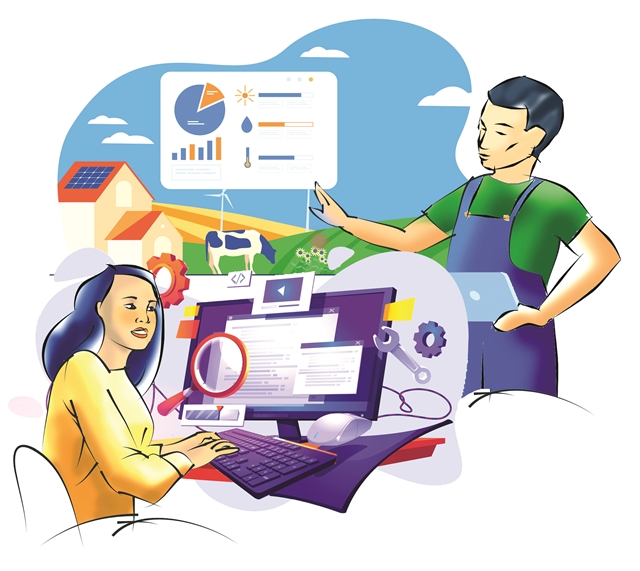Government investment and a mass campaign to improve digital literacy are needed to close the digital divide

It was around this time 76 years ago that saw the beginnings of a popular movement known as the Binh dan hoc vu (Mass Education Movement).
It was initiated by President Ho Chi Minh who, at the first cabinet meeting after the Democratic Republic of Viet Nam was proclaimed, said: “An ignorant nation is a weak nation.”
The campaign to educate and improve the intellect of the people was launched soon after as illiteracy was considered an enemy as dangerous as foreign aggression and famine, in a country that was then 90 per cent illiterate.
It encouraged people of all ages to volunteer to teach others to read and write, and basically helped eradicate illiteracy in Democratic Republic of Viet Nam controlled areas after seven years, despite the ongoing war.
Now amid the war against the coronavirus, another campaign is needed to develop society, even as we are struggling to provide disadvantaged people essential support including food and basic daily needs.
This time we must work to close the digital divide, which has become more apparent during the pandemic.
With social distancing enforced in many cities and provinces, clearly those who can work or study online from home have an advantage over the rest.
While over 70 per cent of individuals in Viet Nam are using the internet, according to the Ministry of Information and Communications, this does not mean they can all use the internet for work or study, or earn a living from it.
The workable internet environment must be through high-speed cables or strong wifi connections, which are not available and affordable everywhere, especially in rural or remote regions.
Even though fixed broadband subscriptions approached 16.7 million and mobile broadband subscribers reached 78 million among the population of nearly 100 million last year, we do not need to second guess to know that those subscribers mainly concentrate in urban areas.
Mobile broadband, despite reportedly covering most of the country, is hardly workable in many areas. Many people struggle with unstable communication even in the centre of Ha Noi, and I have heard complaints regarding this from colleagues who have to help their children with online studying.
According to the Vietnam Institute for Economic and Policy Research’s Annual Economic Report 2021, although the country saw a boom in e-commerce with nearly two-thirds of businesses using digital platforms last year, facilitated by improving e-government, conditions for digital transformation (e.g. digital infrastructure, connectivity, digital payments, progress in technology absorption) remain limited in comparison with some ASEAN countries.
On August 2, telecommunications businesses announced a support package worth nearly VND10 trillion (US$435 million), valuable and timely assistance during the pandemic but only meaningful for those who can afford it.
It is high time the State considered an investment to provide universal workable broadband service to all citizens and allocate free data packages to meet their basic needs. The allocation could be managed using the newly granted citizen IDs. Those who want higher speeds or more data should pay the extra.
Free workable broadband access means more equal access to basic services: healthcare, aid, insurance, food, education, and more job, social, economic and political opportunities.
A universal service also means establishing a huge client/user base, and more efficient management, especially for emerging needs such as public health surveillance.
This is fertile ground for business, trade, education, digital finance, and many other services exploiting big data. It will be a big market for home-grown apps and innovation.
Competitiveness will still be high as users will use their quotas voting for the better service providers. Businesses will have more incentives creating new and quality digital services and making money out of them.
Universal workable broadband service therefore will also lay the foundation for the digital elite to prosper.
Now that the Government is increasing investment in infrastructure to boost the economy, which is heavily affected by the pandemic, this should be part of the package as investment in this will create wealth, improving the knowledge of the population and create conditions for a knowledge economy.
Of course technocrats have many things to do, but to make full use of the infrastructure we need to address a fundamental condition, that is digital literacy among the population.
According to the American Library Association’s digital-literacy task force, digital literacy is the ability to use information and communication technologies to find, evaluate, create, and communicate information, requiring both cognitive and technical skills.
This is where a mass education campaign to improve digital literacy, similar in type and scale of the Binh dan hoc vu, is needed. The State should set the skills standards and create a mechanism to encourage broad participation by multiple sectors of society in the campaign.
Witnessing the abundance of charitable and community spirit during the fight against the pandemic, it is clear it is not too difficult to mobilise capable people and organisations, especially when the Government has appropriate policies to channel their energy.
With the help of modern and creative communication tools their efforts will be multiplied compared to what our predecessors did many decades ago.
If people find opportunities in the new environment, they will make efforts to master new skills to join it.
While we still have to fight the coronavirus and try to control the pandemic with whatever tools we have, we have to accept that we may have to live with it forever and just strive to minimise its destructive effects on our lives.
But just like previous generations who successfully strived to eradicate illiteracy while struggling against famine and foreign aggression, we should together make effort to create a comfortable environment to live and work for all, whatever the adversities. - VNS





